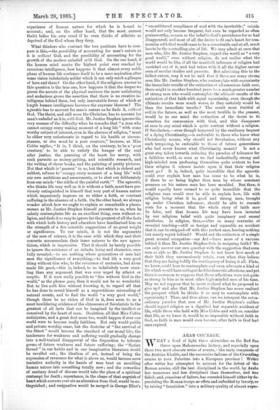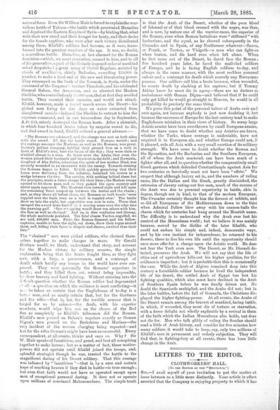ARAB COURAGE.
WHAT a flood of light these skirmishes on the Red Sea throw upon Mahommedan history, and especially upon those two most obscure series of events,—the early conquests of the Arabian Khalifs, and the successive failures of the Crusading armies to turn Palestine into a European province ! Writer after writer has attempted to account for the defeat of the Roman armies, still the best disciplined in the world, by Arabs less numerous and less disciplined than themselves, and has failed; and, conscious of faihire, has consoled himself either by depreciating the Roman troops as effete and enfeebled by luxury, or by raising " fanaticism " into a military quality of almost aver
natural force. Even Sir William Muir is forced to explain the mar vellous battle of Yakusa—the battle which prostrated Hemlius and deprived the Eastern Empire of Syria—by hinting that, what with their new creed and their hunger for booty, and their desire for the female captives, who were after each victory distributed among them, Khistlid's soldiers had become, as it were, trans formed into the greatest warriors of the age. It was, no doubt, a marvellous battle. Heinelius, at last alarmed for the Roman dominion—which, we must remember, seemed to him, and to all of his generation, apart of the divinely imposed order of mankind —had despatched a great army of 90,000 Regulars, assisted by
clouds of auxiliaries, chiefly Bedouins, exceeding 150,000 in number, to make a final end of the new and threatening power. They encamped on the bank of the Yermuk, in Syria, under the command of the Emperor's brother Theodoric, and his celebrated General Bahan, the Armenian, and so alarmed the Moslem Sheikhs, who controlled only 40,000 men, that at first they avoided
battle. They counted their enemies, and would not attack. Kbalid, however, made a forced march across the Desert—his picked men living for five days on water extracted from slaughtered camels—induced the Sheikhs to entrust to him the supreme command, and in one tremendous day in September, A.D. 634, utterly destroyed the Roman hosts. After a skirmish, in which four hundred Arabs taken by surprise vowed to die, and died sword in hand, Khalid ordered a general advauee :—
" The Romans too advanced, and the charge was met on both sides with the sword. All day the battle raged. Fortune varied ; and the carnage amongst the Moslems, as well as the Romans, was great. Ikritna's gallant company, holding their ground firm as a rock in front of KhAlid's tent, bore the brunt of the day ; they were slain or disabled almost to a man. So fierce were the Arabs, that even the women joined their husbands and brothers in the field ; and Huweiria, daughter of Abu Sofian, inheriting the spirit of her mother Hind, was severely wounded in an encounter with the enemy. Towards evening the Romans began to falter. Kl.alid, quickly perceiving that their horse were declining from the infantry, launched his centre as a wedge between the two. The cavalry, with nothing behind them but the precipice, made a fierce charge for their lives ; the Moslem troops opened to let them pass, and £0 they gained the open country and never again appeared. The Moslems then turned right and left upon the remaining force cooped-up between the ravine and the chasm ; and, as they drove all before them, the Romans on both hands were toppled over the bank even as a wall is toppled over.' The battle drew on into the night, but opposition was now in vain. Those that escaped the sword were hurled in a moving mass over the edge into the yawning gulf. One straggling would draw ten others with him, the free as well as chained.' And so, in dire confusion and dismay, the whole multitude perished. The fatal chasm YactIsa engulfed, we are told, 100,000 men. Ficar, the Roman General, and his fellowoaptains, unable to bear the sight, sat down, drew their togas around them, and, hiding their faces in despair and shame, awaited thus their fate."
The " chained " men were picked soldiers, who chained them selves together to make charges in mass. Sir Gerald Graham would, we think, understand that story, and account for the Moslem victory by military reasons, the simple explanation being that the Arabs fought then, as they fight now, with a fury, a perseverance, and a contempt of death which hardly any troops in the world have ever surpassed. They were personally the Romans' superiors in battle ; and they killed them out, retreat being impossible, by sheer bravery and bard fighting. Without entering into the d:fficult question whether the Roman soldier had degenerated ‘ all—a question on which the evidence is most conflicting—it nil,: be taken as certain that the Englishman of to-day is a bett. r man, and as nearly certain that, but for the Gardners and the rifles—that is, but for the terrible armour that is forged for us by science—the Arab, with his superior numbers, would wipe him out on the shores of the Red Sea as completely as Khalid's tribesmen did the Roman.
Khalid's men poured on Bahan's regulars exactly as Osman Digna's men poured on the Berkshires and Marines—the very incident of the women charging being repeated—and but for the rifles Osman's might have been as successful. Every correspondent, at all events, thinks and says so. Why P Sir W. Muir speaks of fanaticism, and greed, and lust all conspiring together to make heroes ; but as a matter of fact, these motivepowers did not operate until Kb&lid joined the troops, and, splendid strategist though he was, trusted the battle to the magnificent daring of his Desert soldiery. That this courage was inflamed by "fanaticism "—that is, by a sure and certain hope of reaching heaven if they died in battle—is true enough ;
but even that faith would not have 80 operated except upon men of exceptional personal daring. It does not so operate
upon millions of convinced Mahommedans. The simple truth is that the Arab of the Desert, whether of the pare blood of Ishmael or of that blood crossed with the negro, was then, and is now, by nature one of the warrior-races, the superior of the Roman, even when Roman battalions were" stiffened" with barbarians, and the equal, as be showed subsequently in the Crusades and in Spain, of any Northerner whatever—Saxon,
or Frank, or Teuton, or Visigoth—a man who can fight-on when beaten, and die hard even whenleft alone. When
he first came out of the Desert, he dared face the Roman ; five hundred years later, he faced the mail-clad soldiers of Europe, and he is facing English soldiers to-day, and always in the same manner, with the most reckless personal valour and a contempt for death which scarcely any Europeans possess. Our soldiers call him a brute because, when wounded, he courts death by slashing at his captors; but if Tommy Atkins knew he must die in agony—there are no doctors or ambulances with Osman Digna—and believed that if be could only get killed he would go straight to Heaven, he would in all probability do precisely the same thing.
We press this point of the personal valour of Arabs over and over again, not because anybody is just now doubting it, but because the successes of Europe for the last century tend to make Englishmen mistaken in their views of history. So many large Asiatic armies have been overthrown by small European armies, that we have come todoubt whether any Asiatics are brave, whether the Turks, whose courage is .undeniable, have not acquired it in European air, and whether Europe could not, if it pleased, rule all Asia with a very small exertion of its military strength. We have come to doubt whether the Roman and the Byzantine, and the Barbarian and the Southern European, all of whom the Arab mastered, can have been much of a fighter after all, and to question whether the comparatively small Greek garrison which defended Constantinople against Asia for two centuries so heroically must not have been "effete." We suspect that although luxury set in, and the numbers of ruling races, like the Italian and the Greek, greatly diminished, the extension of slavery eating-out free men, much of the success of the Arab was due to personal superiority in battle, akin in degree, though not in kind, to that of the modern European. The Crusader certainly thought him the fiercest of infidels, and so did all Europeans of the Mediterranean down to the time when Admiral Pellew blew away with his cannon-balls the charm which for centuries had hung around the Moorish name. The difficulty is to understand why the Arab ever lost his control of the Mussulman world ; but we believe it was mainly because, moved by the dislike of the later Khalifs, who could not endure his simple and, indeed, democratic ways, and by his own instinct for independence, he returned to his deserts, there to live his own life until the opportunity should once more offer for a charge upon the Asiatic world. He does not fear the Turk even now. The Desert, as Mr. Disraeli detected, preserves the Arab. We will not say that the life of cities and of agriculture kills-out his higher qualities, for the evidence is imperfect ; but it is probable that this is occasionally the case. While the Arab of Algiers remained deep into this century a formidable soldier because he lived the independent life of his desert, the settled Arab of Egypt has lost his fighting qualities, which also must have declined in the Arab of Southern Spain before be was finally driven out. No doubt the Spaniards multiplied, and the Arabs did not ; but in the later battles, before the fall of Granada, the Christians displayed the higher fighting-power. At all events, the Arabs of the Desert remain among the bravest of mankind, facing battle, in which, if wounded, they must die of torture or starvation, with a fierce delight not wholly explicable by a revival in them of the faith which the Indian Mussnlman also holds, but does not die for. Men who talk glibly of ruling the Soudan should read a little of Arab history, and consider for five minutes how many soldiers it would take to keep, say, only two millions of Khalid's men in permanent and orderly subjection. They will find that, in fighting-fury at all events, there has been little change in the Arab.



































 Previous page
Previous page